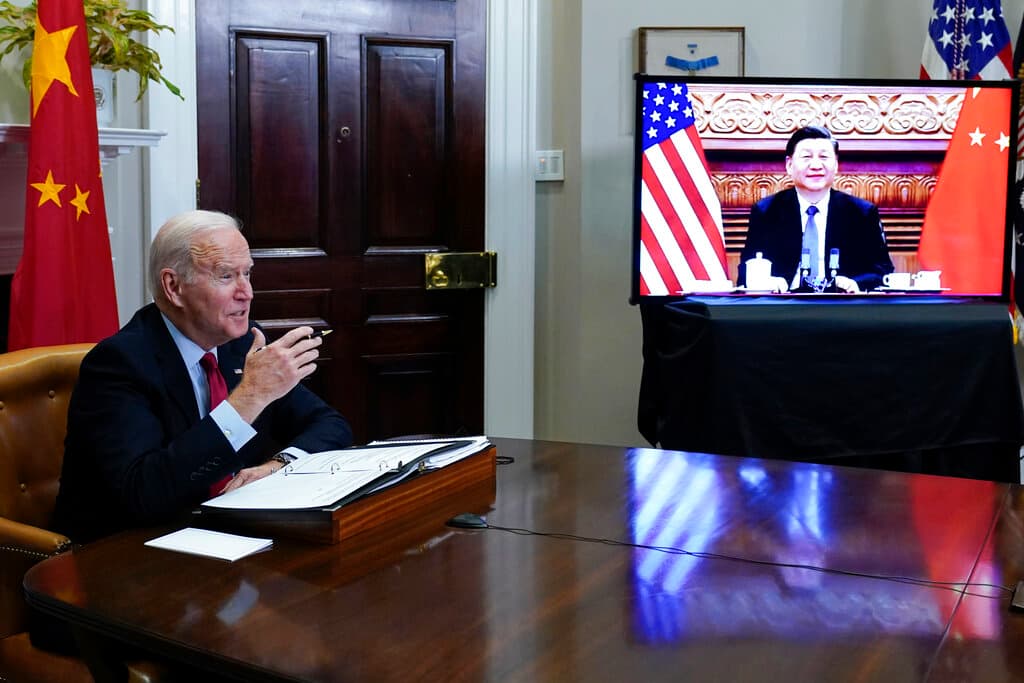Biden, Xi Playing With Fire in a Crowded Theater
Mismanagement of America’s China policy emerges in sharp relief.

The Chinese Communist Party can congratulate itself on another sign of its rise: its seeming ability to dictate American foreign policy. Thursday’s video call between Presidents Biden and Xi disclosed the extent of the Biden administration’s mismanagement of America’s ties with China and the fanciful thinking that continues to guide its China policy.
“Those who play with fire will perish by it,” Beijing’s party boss warned Mr. Biden, referring to Washington’s Free China policy. The U.S. “should be clear-eyed about this.”
It is striking — though perhaps not surprising — that Mr. Xi would feel at liberty to direct such language toward the leader of the free world. It is difficult to image such rhetoric being flung in the direction of a President Trump or a President Reagan, say, at least not without consequences.
Yet, like most authoritarians, China’s communists understand only strength, of which the Biden administration has demonstrated little. While feigning a tough policy posture, team Biden has continued to sell Communist China millions of barrels of oil from America’s strategic reserves.
Even after Covid emerged from China and became a global pandemic, Mr. Biden on Thursday expressed his willingness to continue cooperation on matters of “health security.” His administration is also likely to reverse tariffs on some $350 million in Chinese imports.
Irrespective of whether Speaker Pelosi journeys to Taiwan, the surrounding tit-for-tat has allowed Beijing to portray America as the provocateur to which it must, in the event, respond. A prelude to conflict, perhaps?
As China continues to expand its war machine and global footprint, Mr. Biden’s military has turned its attention to drag shows, diversity training, and projects that would have American servicemen dining on plant-based proteins. The military is likely to lose some 28,000 troops by next year.
The head of the Chinese Communist Party’s central foreign affairs commission, Yang Jiechi, felt emboldened, at the U.S.-China summit last year, to lecture the secretary of state, Antony Blinken, that America has “no right to talk to China from a position of strength.”
The list of Mr. Biden’s mishaps on China is indeed long. It is matched only by the list of instances on which Washington officials have expressed concern over damaged relations with Beijing and the unwanted prospect of conflict. Yet Beijing has repeatedly made clear that it is concerned with neither.
When it comes to Taiwan, too, it is prepared for a crisis. Less than one year after he came to power, on the sidelines of the Asia Pacific Cooperation summit in 2013, President Xi told the Taiwanese envoy, Vincent Siew, a former vice president, that reunification with Taiwan could not wait.
“It cannot be passed on from generation to generation,” Mr. Xi said. Meeting with President Obama a year later, he again stressed the need to reunify the mainland with the “Ming loyalists” in Taiwan.
In 2015, reports aired on China’s state-run CCTV suggested that the People’s Liberation Army was training to attack Taiwan using computer-generated simulations of Taipei. Communist Chinese military officials have repeatedly called for more such exercises and have since 2013 increased their frequency.
“There is no way out for ‘Taiwan independence,’” a spokesman for China’s Taiwan Affairs Office, An Fengshan, said following live-fire exercises held in 2018. Four years later his warning resonates ever louder.
Twenty-nine Chinese warplanes entered Taiwanese airspace last month — a test of America’s commitment to the island democracy. For Beijing, Washington’s tepid response could only be reassuring.
Until recently, China’s Communists spoke of reunification with Taiwan in terms of its ostensible “peaceful” nature. Yet here, too, Beijing’s rhetoric has shifted. The party’s 2020 annual work report omitted the reference.
It spoke instead of “China’s reunification” and its opposition to any “separatist activities seeking ‘Taiwan independence.’” Peace has not been mentioned since — and, as if to obliterate any doubts, Beijing’s top political advisor, Wang Yang, this month called for the party to “resolve the Taiwan question” for a “new era.”
With this list, too, one could continue. Is it, then, that these developments somehow elude Mr. Biden and his team? Are they being waved off as senseless saber-rattling — or, worse, being ignored? For through its historical behavior, rhetoric, and actions, Beijing has repeatedly declared its intent regarding Taiwan, and the broader global order.
So it would be a mistake for Washington to fret over battered American ties with China. It would be a mistake to continue to seek engagement — in health policy, no less — and a means of avoiding conflict. For conflict appears inevitable, and those in Beijing are concerned only with victory.
Yet until the Biden administration stops allowing Beijing to call the shots, it will be on the back foot. The truth is that the business about “those who play with fire” being doomed to “perish by it” should be America’s message to Beijing.

